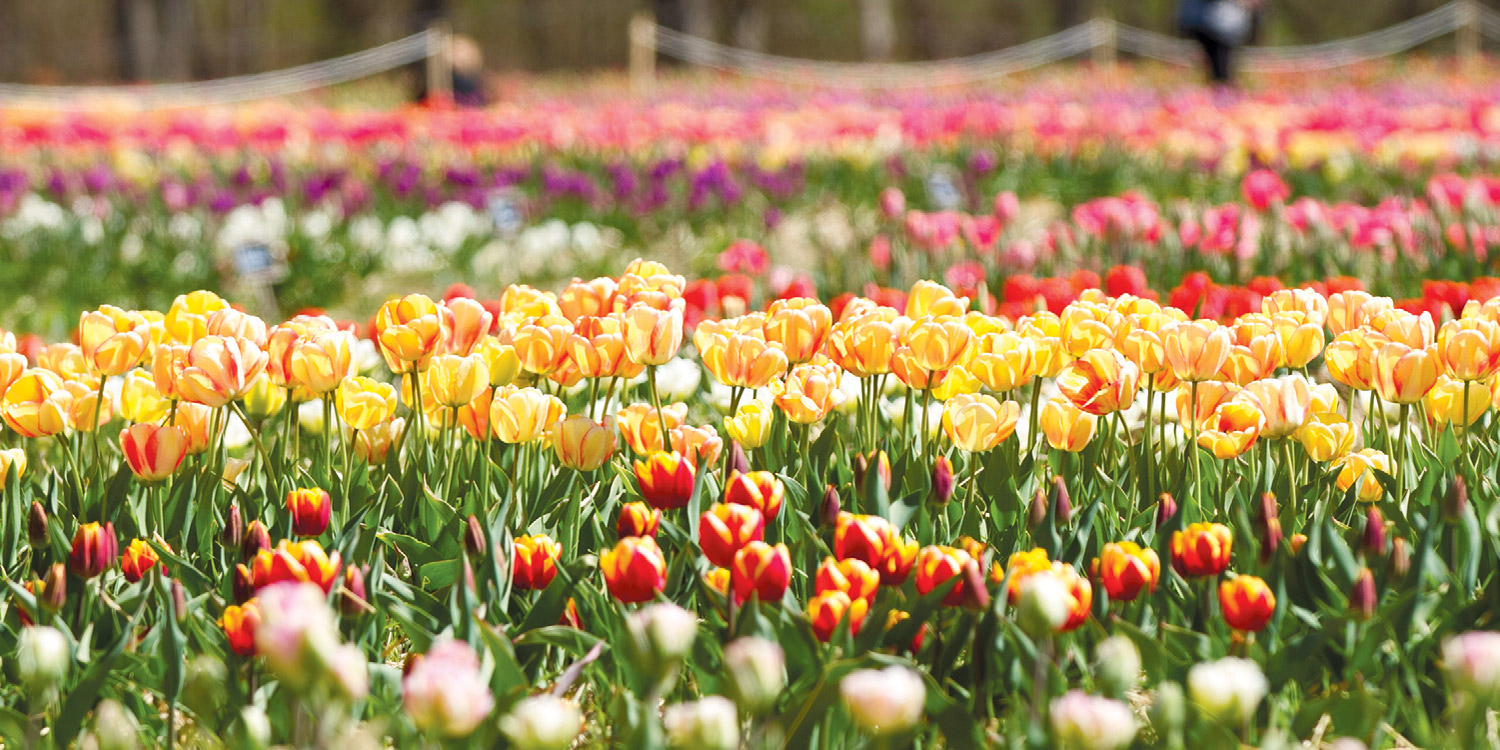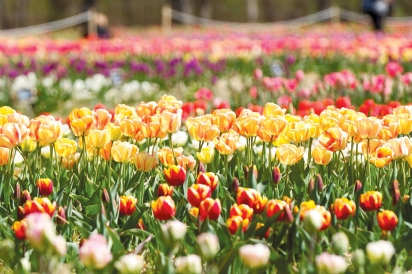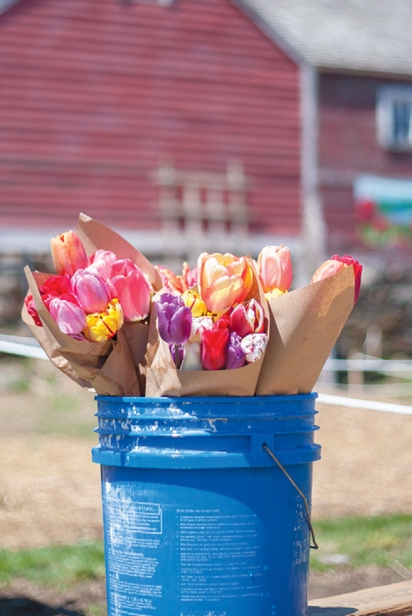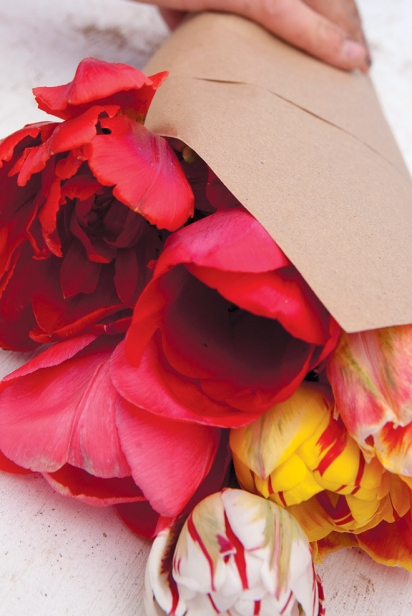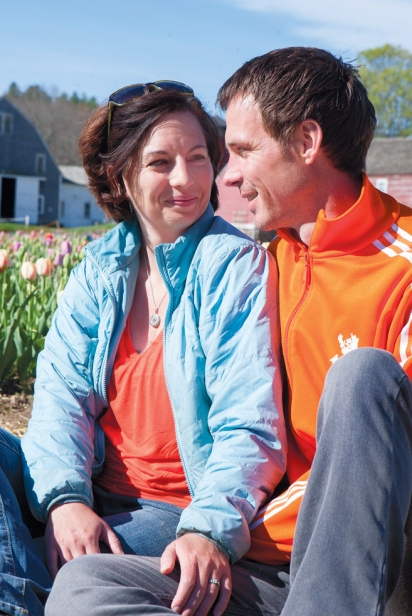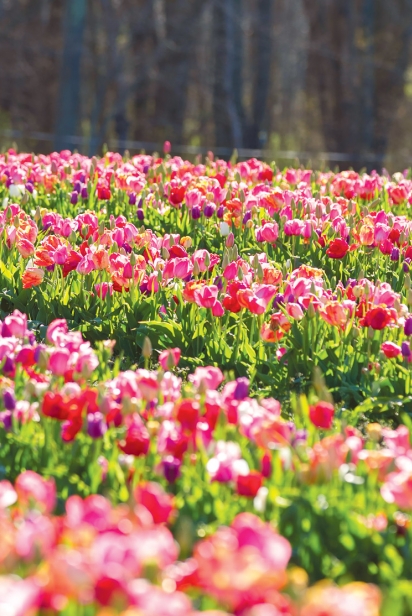Wicked Tulips Flower Farm
Wicked Awesome Farmer Entrepreneurs Jeroen and Keriann Koeman Welcome Thousands to New England’s Only U-Pick Tulip Farm
In the spring of 2016—Wicked Tulips’ first blooming season—some 17,000 people flocked to its five acres of Rhode Island farmland on the edge of Snake Den Park in Johnston to pick armfuls of tulips and admire the show gardens. The tulip farm, located on land leased from the state, is the first of its kind in New England.
The farm welcomed families, newly engaged couples, Baby Boomers, youngsters and oldsters, some of whom came repeatedly. For Wicked Tulips’ owners, charging visitors money to pick tulips or wander the show garden is more than a business transaction.
“We make people feel good and we feel good at the same time,” said Jeroen Koeman of Wicked Tulips’ parent company, EcoTulips.
Although Dutch bulb stock is the source for Wicked Tulips’ resplendent acres of tulips, the company wouldn’t exist but for Craigslist. Here’s the back story: About a decade ago, Jeroen, who’d moved to the United States from Holland for work, thought living with roommates would speed his acclimation to American life, and Keriann’s Craigslist ad seeking a roommate for her Charlottesville, Virginia, home caught his eye. After they met and had a few dinners, Keriann suggested they date, rather than cohabit as roomies.
Their September 2009 marriage planted the seeds for EcoTulips, which they own together. Jeroen, who was from a well-respected tulip farming family in Holland, had dreamt of owning his own business. That, coupled with Keriann’s desire to live organically, inspired them to visit a farmer in Holland who was growing tulips organically.
“My family and I were blown away,” said Jeroen. “He had such weed-free, quality-looking fields.” That visit and Keriann’s introduction to the tulip fields sealed the deal; they realized that growing tulips could bring them—and perhaps others—great joy.
Their tulips are nothing like greenhousegrown tulips people pick up from the market or flower shop for a dinner party or hostess gift. Lacking scent, greenhousegrown tulips are smaller and less colorful than Wicked Tulips’ bold and brazen flowers. Keriann said, “I’ve heard people say, ‘Oh my goodness, that’s a tulip?’ People are seeing tulips they’ve never seen before.”
That’s no surprise, as some Wicked Tulips varieties had never been sold before in this country, such as their Princess Unique, which is more reminiscent of a peony or a rose. Their frilly Parrot Tulip looks less like a parrot and more like a gorgeous flaming dragon. This spring, more than 100 varieties will bloom, up from last year’s 75.
Going organic …
Jeroen’s connections in Holland’s tulip industry led them to sources for some exotic specialty bulbs. They also discovered NLG Holland, a collaborative group of tulip farmers who has eliminated all pesticides or has pledged to markedly reduce pesticide use. Of their organic-certified farmland and their 100% organic tulips (whose bulbs come from NLG Holland), Keriann said, “It’s important to us to not do any more harm.” Listing pesticides’ impacts—damaging the soil, harming birds that drink pesticide-contaminated water and pollen-seeking bees, and affecting children who pick our tulips and put them in their mouths, she said, “Even without pesticides, we can create an amazing product. NLG Holland showed us that there is success out there.”
Earlier tulip-growing adventures and mishaps—in Charlottesville, Virginia, and Long Island’s North Fork—led them to Rhode Island, which had the right weather and was close enough to Keriann’s family in Plymouth, Massachusetts. Ironically, it was Jeroen, not Keriann, who came up with the New England–themed moniker of “wicked,” which reinforces the couple’s desire for Wicked Tulips to grow deep New England roots.
Are they edible?
During World War II’s bleakest days, some desperately hungry Dutch citizens resorted to consuming tulip bulbs. However, Keriann said, “We don’t recommend eating them.” The bulb, with a mildly poisonous center, tastes like a cross between a potato and an onion. Unimpressed by its flavor, Jeroen said, “It’s not, like, ‘wow,’ but ‘hmm.’”
They’re all in, though, on noshing on tulip petals. Each variety and each color has its own taste, said Keriann, who likes the sweetness of red Lalibela petals. Other petals have the peppery taste of nasturtiums. Tulip petals are great in salads, said Keriann, who suggests adding them to a salad of your favorite greens, adding the petals in, as you would tomatoes. At cocktail time, she likes nothing better than enjoying the flavor and beauty of a drink—alcoholic or virgin— topped with a tulip petal. Before consuming, Keriann first brushes off the pollen, as it sometimes causes heartburn.
A year in the life …
Now focused full-time on their EcoTulips bulb company and Wicked Tulips flower farm, the couple—who in past years held other jobs to help pay the bills—have put their faith in Mother Nature, a dangerously fickle business partner. Last year, they lost about 30% of their bulb crop to a late spring frost. Wicked Tulips’ show garden and U-pick gardens are open through April and May but there is no set opening date until Mother Nature says it’s time.
In the summer months, they’re harvesting, inspecting and sorting the bulbs, and ordering more bulbs from Holland. In September and October, they’ll ship pre-ordered bulbs to customers and, when it’s cool enough, plant more bulbs and design the U-pick gardens for the next growing season. Late November, December and January bring the young couple a bit of much-needed, but brief, downtime from the year’s physical labor.
“That’s our time to discuss, plan and brainstorm business development ideas,” said Keriann.
Ensuring they’ve hired enough helpers, finalizing marketing plans and updating their website occupies the couple during February and March; last year, Jeroen built all the tables where people took their picked tulips to be wrapped for travel. March is also when some heavy-duty farm work kicks in, with weeding, irrigating and protecting the bulbs from a late frost, as they had to do last year. “Neighboring Dame Farm let us use their row cover … it saved us,” recalled Jeroen.
Bloom times are uncertain and flexibility is key. They encourage visitors, especially those from out of state, to check their frequently updated bloom report at WickedTulips.com. To manage crowd control, they’ve required online reservations for weekend visits, which might be extended to weekdays, as well. The couple may offer season passes to defray costs for frequent Wicked Tulips’ visitors. All the necessary info is on their website.
This spring, they plan to have early-blooming and late-blooming show gardens and U-pick gardens to extend the season and they anticipate twice the number of visitors as last year. While other tulip festivals traditionally feature show gardens, Wicked Tulips promoted the U-pick during its first Rhode Island season. This year, they want to find a happy medium between the two. No matter what draws visitors to Wicked Tulips, Keriann and Jeroen want everyone to experience the joy they feel by having created a happy place.
Visit WickedTulips.com for the spring Bloom Report and to register for pick-your-own tulips.
Wicked Tulips Flower Farm
90 Brown Ave., Johnston, RI
401.400.2806; WickedTulips.com


